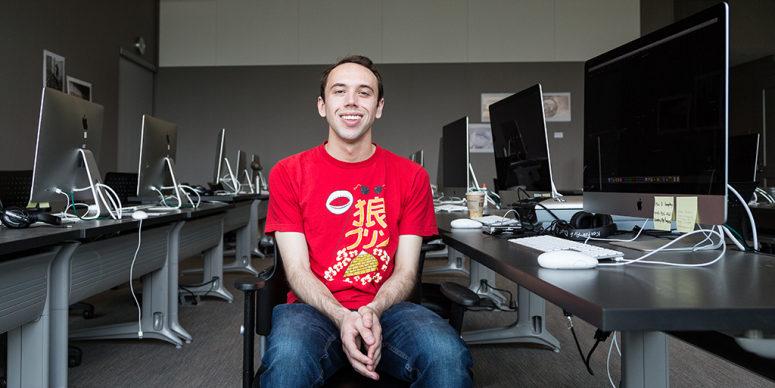Game On

Photo by Cameron Peters ’20
From Kenyon News - May 7, 2018
Joey Schutz ’18 has more than just his upcoming graduation to celebrate this spring.
Schutz, a video game developer from Chattanooga, Tennessee, recently released to much acclaim “Winter, 2001: Someone tell Luigi I love him,” an independent video game project he completed for Professor of Art Claudia Esslinger’s “Experimental Film and Video” course last year. Since its January release, “Winter, 2001” has been featured on gaming website Warp Door and has secured a spot on PC Gamer magazine’s list of “Free Games of the Week.” Julie Muncy of Wired has praised it as “frightening … and beautiful.”
The project is an example of an “alt game,” an explorative genre Schutz describes as the “gaming equivalent of an arthouse film.” In it, players control the popular Nintendo Co. character Luigi as he scours a haunted manor for his lost brother. Meanwhile, a disembodied Mario floats in the bottom corner of the screen, watching the events unfold on an old-timey analog television set.
Schutz, a synoptic major studying interactive and emergent media, says his expansive liberal arts education has given him a unique edge as a game developer.
“One of the great things about Kenyon is that I’m not just learning all these things, but I’m learning them from outside the game perspective, which has been really helpful,” Schutz said. “I have all these different disciplinary perspectives. How does an artist approach art? How does a filmmaker approach cinematography? Then, on the side, I read game design textbooks and watch Game Developers Conference talks so I can get the game perspective, as well.”
At Kenyon, Schutz takes classes in programming, visual arts, creative writing, music and architecture. He has even pursued an independent study course on tabletop role-playing games under the guidance of Assistant Professor of English Piers Brown.
“He’s an example of the whole concept of the synoptic major at its best,” said Visiting Professor of Mathematics and Computer Science James Skon, one of Schutz’s faculty advisors. “Joey has designed games, he’s designed the graphics, he’s designed the gameplay, he’s done a lot of programming, he’s done the music. The synoptic major gives someone like Joey a chance to do what they really want to do, and to do it well.”
Since June, Schutz has been collaborating with the NASA Ames Research Center’s Laboratory for Advanced Sensing on a project to build an artificial intelligence program, or AI, to classify the world’s coral. The program is built as a game where players take on the role of world-traveling marine biologists; as players dive into the ocean depths to catalog lifelike virtual coral, the AI runs in the background, studying their decisions and learning how to discern different coral varieties on its own.
Schutz said he “wears lots of hats on the project,” but he focuses primarily on design, programming and audio. As the game nears completion, it will be released first to scientific experts and eventually the general public.
In the meantime, Schutz has been preparing himself for his graduation and beyond. He recently returned to Gambier from the annual Game Developers Conference in San Francisco, the world’s largest professional game industry event, where he attended talks on professional game design and networked with fellow developers from around the globe. After Kenyon, he hopes to join a large game studio, particularly one specializing in first-person, narrative games, while pursuing his own independent projects on the side.
If he can gather enough funding, Schutz said he would love to fly back to San Francisco to attend the 2019 Game Developers Conference. Perhaps in a few years he’ll be the one on stage.
—Ben Hunkler ’20